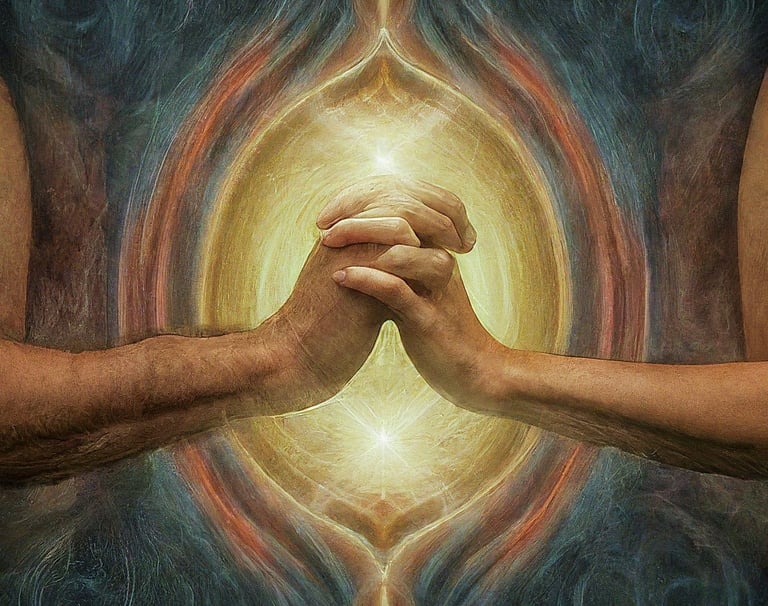Pleasure or Procreation?
Unpacking the Divine Gift of Sexuality.
ARTICLES
A. Cortés
6/14/20249 min read


Introducción
In recent years, the word "sexuality" has been reduced to a mere expression of power and physical pleasure, stripped of its connection to love and commitment. This distorted view has eroded respect for marriage, traditionally considered the foundation of the family unit. Today, a culture is fostered where sexual enjoyment is sought without emotional bonds or responsibilities, which has created a void in human relationships and a loss of meaning in intimacy. As J. Alejandre points out:
Furthermore, the rise of male and female sexual liberation and new legislation recognizing the diversity of sexual orientations have generated debate about the traditional definition of sexuality, which used to be limited to the relationship between a man and a woman. While these social changes in terms of inclusion and recognition of rights can be viewed positively, they have also been used by some to promote a view of sexuality centered on individual pleasure and consumption, detaching it from values such as love, commitment, and responsibility.
In this article, we will explore sexuality from a comprehensive perspective, beginning with its biblical roots and its evolution to the current definition. We will analyze its crucial role in the marital relationship, unveiling the teachings of various authors on its function in marriage. Finally, we will delve into the relevance of biblical advice to foster a healthy and fulfilling sexuality in the couple, and how this positively influences society.
The Bible: Sexuality, Given to All; A Privilege for Few.
In the narrative of the Old Testament, we find diverse perspectives on sexuality, revealed in books like Genesis, Leviticus, Deuteronomy, Chronicles, Kings, Ruth, and the Song of Songs, among others. These texts show us that:
Sexuality is a natural and positive part of human life. It is intended for procreation and the continuity of the family, as evidenced by the divine command to "...Be fruitful, and multiply" (Genesis 1:28). Sexuality is celebrated in the Song of Songs as an expression of love and desire between a man and a woman.
Sexuality in the Old Testament was framed within a patriarchal context. Men had greater control over sexual and marital relationships. They could divorce their wives for various reasons (Deuteronomy 24) and, in some cases, have multiple wives (Exodus 21:10; Deuteronomy 17:17; 1 Kings 11). This dynamic reflected the social structure of the time, where men occupied a dominant position.
Thus, the perspectives on sexuality in the Old Testament reflect its historical and cultural context, and caution should be exercised when dogmatizing its teachings today. Despite this, the book Song of Songs, a biblical poem that celebrates erotic love and the beauty of mutual desire, masterfully reflects how romantic passion can elevate sexual relations to their highest expression. There, "physical beauty, attraction, and passionate physical love are glorified and celebrated" (Morton, Kelsey, 1986: 102).
In the New Testament, we find references to sexuality both in the teachings of Jesus and in the epistles of the Apostle Paul, who addresses the topic in greater depth. In Matthew 5:27-28, 31-32, Jesus spoke about adultery and divorce, and also about sinful sexual thoughts. The Apostle Paul, for his part, offers a distinct perspective on sexual relations. In his writings, the emphasis is not so much on procreation, but on the control of carnal impulses (1 Corinthians 7:2, 9). Paul considers marriage as a suitable framework for sexual expression, especially for those who are burning with passion (verse 9 NIV).
It is also relevant to mention that it was through the influence of Augustine of Hippo and his morality influenced by Gnosticism that the Catholic Church adopted a negative view of sexuality, considering it even within marriage as something dirty and potentially sinful that "could easily become venial sin... mortal sin" (Ibid).
Sexuality and the Plurality of Today
The traditional conception of sexuality, rooted in religion and morality, was challenged and transformed by the advent of sexology. This new scientific discipline replaced the religious category of sin with medical concepts such as illness, mental disorder, and depravity, radically altering the social meaning of sex.
Authors like Zapiain argue that, in our complex world today, it is impossible to define human sexuality from a single perspective. We live in the face of "a multidimensional reality" (Zapiain, 2014: 24), where each discipline (art, science, philosophy) and each social group (including religious movements and organizations) approaches sexuality from diverse and sometimes contradictory angles.
Despite this complexity, the most basic definitions of sexuality often focus on the biological distinction between male and female (Morton T. Kelsey, 7). That is, the innate capacity of the individual to relate and manifest as masculine or feminine (Alejandre, 27). The Dictionary of the Royal Spanish Academy (DRAE) defines this concept as the set of activities and behaviors related to sexual pleasure. (DRAE (© 2005-2016)).
However, a more comprehensive definition is needed. Campbell describes sexuality as a holistic process that integrates emotional, physical, intellectual, and social aspects in a way that enriches and strengthens the self-esteem and personality of the individual: "It encompasses intimacy, romance, sensuality, eroticism, and relationships... contributes to the quality of life and sense of well-being of the individual" (Campbell, Peterson, 8).
Sexuality: Is it Only for Sexual Impulses?
In this sense, sexuality is founded on the capacity for relationships that we possess as men and women. Alejandre highlights that masculinity and femininity are essential attributes that play a crucial role in marriage... "masculinity and femininity must have reached high levels of psychosocial maturity to contribute decisively to the formation of marriage" (Alejandre, 28). In this way, marriage and sexuality are intimately intertwined. On the one hand, sexuality within marriage becomes the natural channel for procreation and the raising of children, ensuring the continuity of the family and society. And on the other, it helps to "legitimately channel sexual impulses" (Morton T. Kelsey, 118).
However, the sexual relationship goes beyond sexual desire, excitement, and orgasm (Zapiain, 250), or the simple use of the genitals, reducing it to a mere matter of pleasure or a reproductive process. As previously explored, sexuality is a multifaceted dimension of the human being, encompassing emotional, physical, intellectual, social, and spiritual aspects. In other words, caresses, jokes, kisses, and words of affection, those small gestures that seem insignificant in everyday life, become sensory experiences that express love and strengthen the marital bond (Alejandre, 47, 50). It is these subtleties that nurture and make the relationship flourish, creating a space of intimacy and complicity. "Affections allow the resonance of love in the body" (Ibid).
Sexuality: It Must Be Nourished in Time
The deeper the emotional and affective connection between spouses, the more enriching and dynamic their sexual experience will be. In the words of Khurana: "a good sexual relationship has a lot to do with the things that the couple does outside of bed" (Khurana, Joshi, 2017).
Sexual satisfaction and the degree of enjoyment of sexual relations are the result of components such as affective communication, time spent together, sexual satisfaction, problem-solving, roles, etc. "Two married people need to modify themselves according to each other in terms of 'sensory, motor, emotional and intellectual' capacities" (Ibid).
On the other hand, a recent study conducted with several couples to discover their degree of marital satisfaction found that a satisfying sex life and a warm interpersonal climate seem to matter more than a high frequency of sexual relations (Schoenfeld, Timothy, et al., 2017). Ultimately, satisfaction in sexual relations is a fundamental pillar for marital happiness, as Morfa rightly points out (Morfa, 159).
It is important to clarify that sex is not the magic solution to all couple problems, nor is it the cause of all of them. However, there is a bidirectional relationship between sexuality and the dynamics of the couple: sexual problems can negatively affect the relationship, and in turn, conflicts in the relationship can manifest themselves in sexual intimacy. This interconnection can have repercussions on other aspects of marriage, generating a vicious cycle that is important to address in a comprehensive manner.
Feelings of sexual guilt, which interfere with the sexual experience, can be considered sexual problems. The denial or repression of sexuality can trigger a series of psychological and physical disorders, as Zapiain and Kelsey point out (Zapiain, 43; Kelsey, 117). As Morfa aptly notes: "Many sexual problems are an indication of difficulties with intimacy... To speak of intimacy is to speak of love, of emotion, of sharing" (Morfa, 89).
Sexual Intimacy Is Not (Just) Sexual Intercourse
The sexual act itself does not guarantee intimacy. However, when sexual behavior transcends the merely physical and becomes a mutual surrender, a space of closeness, shared pleasure, and exploration of erotic fantasies, then sexuality is transformed into a truly intimate experience. "It is necessary to share myself, to give myself in that encounter and share my feelings so that through sexual behavior there can be intimacy" (Ibid. 89).
Sternberg's triangular theory of love enriches the concept of intimacy by adding two essential components: passion and commitment. According to this theory, a successful relationship and lasting love are built on these three interconnected pillars. Intimacy, passion, and commitment must be present in balance to achieve consummate love, the fullest and most satisfying form of romantic love (Panayiotou, 108-117).
Conclusion
While some contemporary authors tend to reduce sexuality to its genital dimension or detach it from the Judeo-Christian tradition, numerous experts recognize the persistent influence of biblical principles in building fulfilling and satisfying couple relationships. Consequently, for a marriage to flourish and achieve the unity that God designed from the beginning, it is essential to banish selfishness and embrace mutual surrender, becoming "one flesh" (Genesis 2:24).
The divine ideal establishes a framework in which the couple can reach their maximum potential for fulfillment. In this sense, spiritual values play a crucial role in marriage. Recent studies reveal that couples who live in accordance with their religious convictions tend to be more empathetic, responsible, and perceptive, which translates into greater satisfaction in their relationships (Khurana, Joshi, 2017). D. Hawkins states: "The strength of the ego has such power that it can only be overcome with spiritual power" (Hawkins, 2014: 9).
Wheat, for his part, speaks of marriage as the 'small private kingdom' where "you and your spouse dwell with Christ," [where the] "act of love [is] a central part of life" (Wheat, 1980: 208). Ellen G. White also sees something similar when she says that it is a "sacred circle that must not be broken. No one has the right to enter this circle" (White, 1999: 279).
Since sexuality is closely linked to affectivity, the capacity to love, and the ability to relate to others, it is essential to remember that: "affectionate hearts, truthful and loving words will produce happy families" (White, 1999: 548). "Ultimately, Christ desires for his followers to experience a full and abundant life (John 10:10), which can include the joys and fulfillment found in a loving and intimate marriage."
Sources:
All Bible verses are from the KJV unless otherwise noted.
Jesús Alejandre. 25 lecciones sobre convivencia matrimonial (Santander, Spain: Sal Terrae, 1980). 89).
Morton T. Kelsey, and Barbara Kelsey. Sacrament of Sexuality. (Warwick, N.Y: Amity House, 1986),102.)
Véronique Mottier. Sexuality : A Very Short Introduction. (Oxford: Oxford University Press, 2008.)
Javier Zapiain. Psicología de la sexualidad (Madrid: Larousse - Alianza Editorial, 2014), 24).
Diccionario de la Real Academia Española (© 2005-2016 Apple Inc.), “Sexualidad”.)
Whitney Campbell and Nicholas E. Peterson. Handbook on Sexuality: Perspectives, Issues and Role in Society. New York, N.Y.: Nova Science Publishers, Inc, 2012. eBook Academic Collection (EBSCOhost), EBSCOhost (accessed June 20, 2017), 8.).
Kamal Khurana and Aneeta Joshi. ("Marital Satisfaction and Spiritual Personality: A Relational Overview." Global Journal Of Enterprise Information System 9, no. 1: 29-35. Computers & Applied Sciences Complete, EBSCOhost-accessed June 21, 2017), ?).
Elizabeth A Schoenfeld, Timothy J Loving, Mark T Pope, Ted L Huston, and Aleksandar Štulhofer. "Does Sex Really Matter? Examining the Connections Between Spouses' Nonsexual Behaviors, Sexual Frequency, Sexual Satisfaction, and Marital Satisfaction." (Archives Of Sexual Behavior 46, no. 2: 489-501. Academic Search Complete, EBSCOhost (accessed June 22, 2017). ?)
Georgia Panayiotou. Love, commitment, and response to conflict among Cypriot dating couples: Two models, one relationship (International Journal Of Psychology 40, no. 2: 108-117. Psychology and Behavioral Sciences Collection, EBSCOhost- accessed June 20, 2017), 109.)
David R. Hawkins. I: reality and subjectivity (Australia: Hay House, 2014), 9.)
Ed Wheat and Gaye Wheat. El placer sexual: ordenado por Dios ; un manual completo para la pareja cristiana (Puerto Rico: Editorial Betania, 1980), 208, 2010.)
Elena White. El Ministerio de Curación (Michigan: Pacific Press Asociation, 1999), 279).
Elena White. Testimonies for the Church IV (Michigan: Pacific Press Asociation, 1999), 548.
"The concept of sexuality has been the victim of a profound distortion and trivialization, largely due to the vulgar use that has been given to it in the media, pornography, and the entertainment industry. The proliferation of images and messages that reduce sexuality to a mere physical act, stripped of its emotional and spiritual dimension, has contributed to this degradation."





